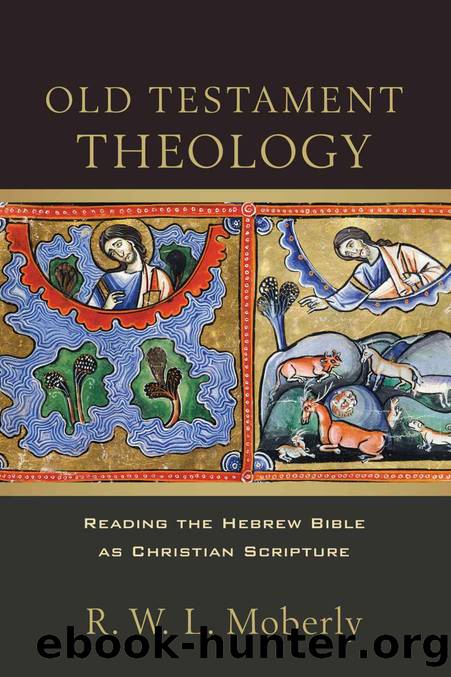Old Testament Theology: Reading the Hebrew Bible as Christian Scripture by Moberly R. W. L

Author:Moberly, R. W. L. [Moberly, R. W. L.]
Language: eng
Format: epub
Tags: REL006090, Bible (Old Testament—Theology), REL006210
ISBN: 9781441243096
Publisher: Baker Publishing Group
Published: 2013-11-19T00:00:00+00:00
Some Different Ways in Which Jonah Could Have a Problem with Divine Mercy
If, then, Jonah’s problem is with divine mercy, we are still left with the question of whether it is possible to specify exactly what it is about divine mercy to which he takes exception. There is more than one way in which the issue can be imagined, and I will try to articulate the moral and existential logic of a number of different readings. Each reading raises some facet of divine mercy that can in practice be found objectionable, and so merits reflection.
Possible Danger to Those Who Show Mercy
One recurrent construal of Jonah’s complaint is to see it as expressing his worry that his being a channel of YHWH’s showing mercy to the Ninevites might mean risk to Israel. This depends upon reading the text with two particular assumptions to the forefront. On the one hand, there is the role of Assyria elsewhere in the Old Testament as the great enemy of Israel, an enemy that overwhelms the northern kingdom in 721 BC. On the other hand, there is the strong likelihood that the book is written at a time subsequent to the Assyrian destruction of Israel, when knowledge of that could be presupposed on the part of author and audience alike. Thus Jonah can be read as lamenting the fact that to be an agent in the sparing of Nineveh could mean preserving Nineveh for its subsequent destruction of Israel. According to Renaissance Jewish scholar Abravanel, Jonah “knew the evils and exiles that [Nineveh] would bring on the tribes of Israel in the future; hence he yearned that the nation of Assyria be destroyed and Nineveh its capital be utterly smitten. This is why he fled instead of going there.”43 Or as John Sawyer succinctly puts it, Jonah “was being asked in effect to sign his own people’s death warrant.”44
Although neither of the two assumptions on which this reading depends are specified in the text of Jonah, that hardly invalidates the reading, for almost all readers will be aware of aspects of the wider canonical context. Indeed, the point at issue is important: the recognition that the bestowal of mercy may be costly, even potentially or actually fatal, for the one who bestows it (or is the agent of divine bestowal). For even a repentant recipient of mercy may only be repentant in the short term. What is to prevent that recipient from turning against the benefactor in the longer term?
A memorable outworking of this theme constitutes one of the major subplots in Steven Spielberg’s film Saving Private Ryan. In the aftermath of the Normandy landings on D-Day, Captain Miller (Tom Hanks) leads a group of soldiers into occupied France to recover Private Ryan (Matt Damon), who has parachuted into an advanced location, because Ryan’s three brothers have already been killed in the landings. Miller takes as an interpreter Corporal Upham (Jeremy Davies), who is a good linguist but otherwise naïf and thoroughly unmilitary; whenever there is
Download
This site does not store any files on its server. We only index and link to content provided by other sites. Please contact the content providers to delete copyright contents if any and email us, we'll remove relevant links or contents immediately.
The Aleppo Codex: A True Story of Obsession, Faith, and the Pursuit of an Ancient Bible by Matti Friedman(680)
Tower of Babel by Hodge Bodie(675)
Sarai by Smith Jill Eileen(582)
Zondervan Handbook of Biblical Archaeology: A Book by Book Guide to Archaeological Discoveries Related to the Bible by Price J. Randall & Price J. Randall & House H. Wayne & House H. Wayne(544)
Essential Judaism by George Robinson(525)
Food in Ancient Judah by Shafer-Elliott Cynthia(503)
Christian Faith in the Old Testament: The Bible of the Apostles by Gareth Lee Cockerill(497)
Essential Exposition of the Psalms by Saint Augustine(497)
Becoming the Woman God Wants Me to Be by Donna Partow(466)
On the Book of Psalms: Exploring the Prayers of Ancient Israel by Nahum M. Sarna(422)
A Short Introduction to the Hebrew Bible by John J. Collins(410)
The Beginning of Politics by Halbertal Moshe; Holmes Stephen;(396)
Beginning at Moses: A Guide to Finding Christ in the Old Testament by Michael P. V. Barrett(395)
The Gospel According to Eve by Amanda W. Benckhuysen(390)
Through the Psalms With Derek Prince by Derek Prince(385)
The Life of Moses by Gregory of Nyssa(380)
Abraham by Frances Worthington(366)
Six Themes in Psalms Everyone Should Know by Creach Jerome F. D.;(358)
Creative Word: Canon As a Model for Biblical Education by Walter Brueggemann(357)
